 Abraham Lincoln
If given the truth, the people can be depended upon to meet any national crisis...
Abraham Lincoln
If given the truth, the people can be depended upon to meet any national crisis...
 Guildford news...
for Guildford people, brought to you by Guildford reporters - Guildford's own news service
Guildford news...
for Guildford people, brought to you by Guildford reporters - Guildford's own news service
Beekeeper’s Notes August 2015
Published on: 1 Aug, 2015
Updated on: 24 Jul, 2015
So Much Owed To So Many By So Few
In the latest in a series of Hugh Coakley’s Beekeeper’s Notes, he writes about harvesting honey.
It’s about now when beekeepers around the country are harvesting honey from their colonies. It is also the time when I marvel about how productive the bee is and how much we owe this efficient, gentle, wondrous creature.
The queen is not laying quite as many eggs now, the peak laying period being around June. The adult bee population though is at its absolute peak. So the hive is at its strongest and there is plenty of nectar around. The bees are working their hardest in our gardens and fields to bring in the sugary syrup from the flowers. And they collect far more than they will need to get them through the winter. It is this surplus, this wonderful abundance that gives us the perfect bounty that is honey.
The way bees convert nectar to honey is a marvel in itself. The bees pass it between each other concentrating it while they do so. They add enzymes to convert the sucrose in the nectar into glucose and fructose. They then store it in the comb, the wax creation that they have made with such precision, and they fan it to evaporate the water content. It is transformed from 80% water and 20% sugar to a super-saturated 20% water and 80% sugar.
Once it is ready, they cover it with a thin film of wax and it is ready, ready for storing or ready for the beekeeper.
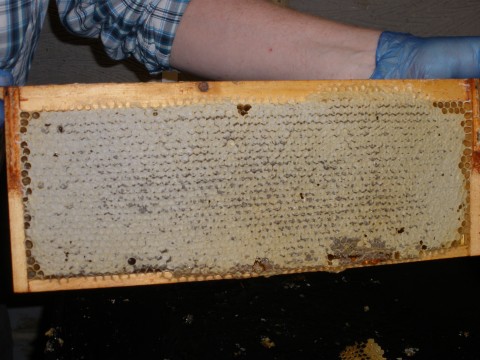
A frame of wax comb filled with honey and capped with a thin wax film. Each full frame holds about 2lbs of honey.
The next bit is simple if a bit sticky.
The beekeeper removes the spare honey from the hive, slices off the thin wax coating and spins the honey out in a centrifugal extractor.
I hire the extractor from our club, Guildford Beekeepers Association. It is manual so plenty of exercise.
It gets strained through a stainless steel filter and decanted straight into jars. Very pure, very natural.
So, when you buy honey from small, local beekeepers, you can be confident that there are no additives or modifications. It is simply as the bee has made it, just pure honey. I can’t think of a more natural product.
It takes about 500 bees to make a jar of honey. To paraphrase Churchill but without doing the voice: “Never in the history of human striving has so much been owed to so many (bees) by so few (humans).”
PS: Last month, I talked about my friend’s hive which had Chronic Bee Paralysis Virus. Positive ending to the story. His hive is recovering, so good news. I’ll keep you posted if I hear any more.
Responses to Beekeeper’s Notes August 2015
Leave a Comment Cancel reply
Please see our comments policy. All comments are moderated and may take time to appear. Full names, or at least initial and surname, must be given.
Click on cartoon for Dragon story: Public Asked for Views on SCC’s Proposal for Reduced Speed Limits



Recent Articles
- Museum Shines a Light on Victorian Send, Ripley and Pyrford
- Guildford Festival Burst with Colour, Culture and Community Spirit
- Conservationists Celebrate Victory As Fast-food Plan At Nature Reserve Is Turned Down
- Incident in High Street – Man Found Unresponsive
- Letter: The Weyside Scheme Is Not Going To Be GBC’s Woking
- Guildford’s First “Bike Bus”
- Notice: Free Bandstand Concerts
- Councillors Hear How the Weyside Urban Village Project Became a Multi-million Risk
- NHS Surrey Issue Heatwave Advice Following Met Office Warning
- Guildford Charity’s Tribute To The Great Stevie Wonder


Recent Comments
- S Callanan on Letter: A Simple Footbridge Should Have Been Affordable to Keep Towpath Over Weir Open
- Helen Skinner on Guildford’s First “Bike Bus”
- Tony Harrison on Busy First Half of 2025 for Scouting in Guildford
- John Redpath on Letter: Front-line Police Officers Are Heroes But Admin and Comms Need Improvement
- Angela Richardson on Letter: A Simple Footbridge Should Have Been Affordable to Keep Towpath Over Weir Open
- Jim Allen on Letter: Front-line Police Officers Are Heroes But Admin and Comms Need Improvement
Search in Site
Media Gallery
Dragon Interview: Local Artist Leaves Her Mark At One of England’s Most Historic Buildings
January 21, 2023 / No Comment / Read MoreDragon Interview: Lib Dem Planning Chair: ‘Current Policy Doesn’t Work for Local People’
January 19, 2023 / No Comment / Read MoreA3 Tunnel in Guildford ‘Necessary’ for New Homes, Says Guildford’s MP
January 10, 2023 / No Comment / Read More‘Madness’ for London Road Scheme to Go Ahead Against ‘Huge Opposition’, Says SCC Leader
January 6, 2023 / No Comment / Read MoreCouncillor’s Son Starts Campaign for More Consultation on North Street Plan
December 30, 2022 / No Comment / Read MoreCounty Council Climbs Down Over London Road Works – Further ‘Engagement’ Period Announced
December 14, 2022 / No Comment / Read MoreDragon Interview: GBC Reaction to the Government’s Expected Decision to Relax Housing Targets
December 7, 2022 / No Comment / Read MoreHow Can Our Town Centre Businesses Recover? Watch the Shop Front Debate
May 18, 2020 / No Comment / Read More



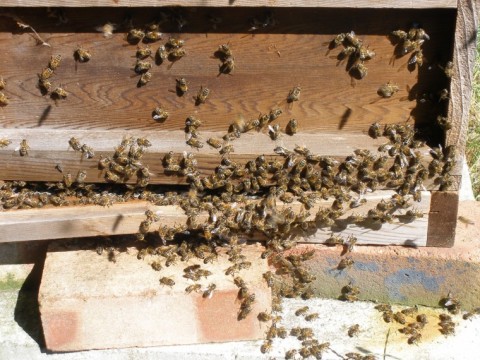
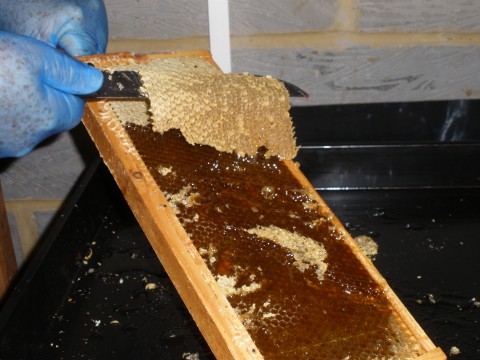
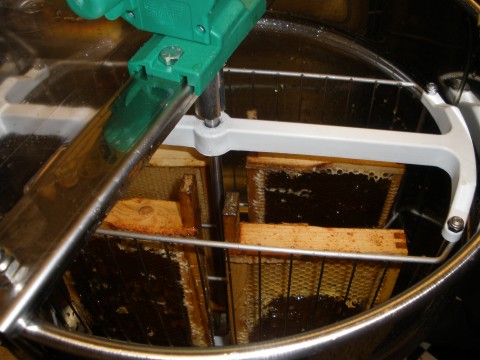
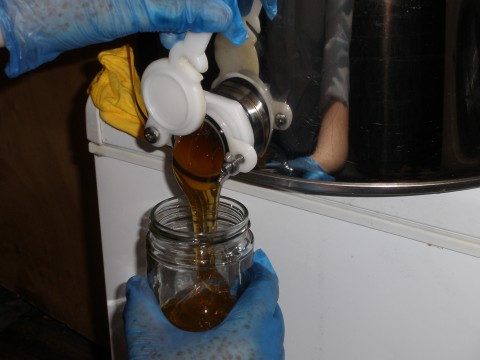
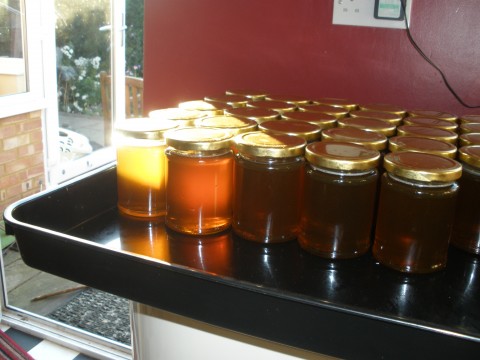



Mary Bedforth
August 1, 2015 at 1:57 pm
In spite of a EU ban on neonicotinoids, the DEFRA Minister is allowing the use of this pesticide following pressure from the NFU.
I would encourage those concerned to sign the “38 Petition” to the Prime Minister.
Marie Coakley
August 3, 2015 at 8:57 pm
I agree. It is known that neonicotoids affect bees. As a basic, we should adopt the precautionary principal when it comes to something as important as our pollinating insects.
Hugh Coakley